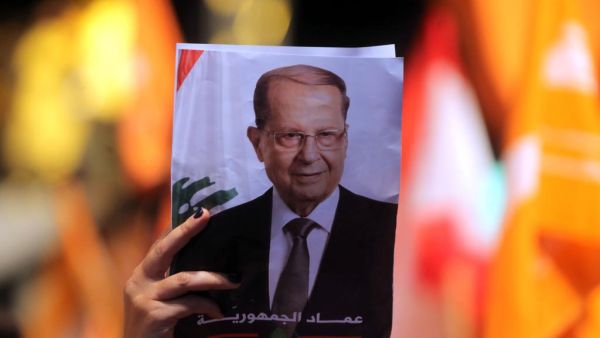Now that President Michel Aoun has set Oct. 15 as the date for binding consultations with parliamentary blocs to designate a new prime minister, attention is focused on who will be the favorite candidate to be chosen to form a new government.
Also, in the absence of a consensus among rival factions on a single candidate for the premiership, it remains to be seen whether Aoun’s move will pave the way toward agreement on the shape and make-up of the next Cabinet.
Meanwhile, France, which has emerged as the main power broker in Lebanon since the deadly explosion that devastated Beirut Port in August, will hold a humanitarian aid conference for Lebanon in November, French Foreign Minister Jean-Yves Le Drian said Wednesday. The conference was initially planned for the end of October.
Le Drian also told the French National Assembly that the Lebanon international contact group would meet in the coming days to reiterate the need for the formation of a government.
France and the international community have been pushing Lebanon’s political leaders to agree on the swift formation of a new government to enact reforms badly needed to unlock promised international aid to steer the crises-ridden country out of its worst economic and financial crunch since the 1975-90 Civil War.
“President Aoun has given parliamentary blocs eight days to agree on a candidate to be designated as the next prime minister,” a source at Baabda Palace told The Daily Star Wednesday.
“For his part, the president will hold a series of contacts with heads of parliamentary blocs to urge them to speed up a consensus on naming a candidate for the premiership,” the source said.
The source added that Aoun was unlikely to hold side talks with parliamentary blocs in a bid to reach a consensus beforehand on a new premier as he did in the run-up to the designation of Hassan Diab as prime minister last December before holding the binding consultations with these blocs.
Aoun’s action at the time had sparked a controversy and accusations, mainly from Future Movement MPs, about violating his constitutional powers with regard to the Cabinet formation process.
Under the Constitution, Aoun is required to designate a candidate for prime minister with the most support from parliamentary blocs.
A statement released by the presidency said that under Article 53 in the Constitution, the president would hold parliamentary consultations to designate a prime minister to form a new government on Oct. 15 at Baabda Palace.
The one-day consultations will take place more than two months after caretaker Prime Minister Hassan Diab resigned over the Aug. 4 port explosion, and 19 days after Prime Minister-designate Mustapha Adib stepped down, saying he was unable to break the stalemate over the shape of the new government.
Adib stepped down on Sept. 26 after his attempts to form a small 14-member Cabinet of non-partisan experts to deliver reforms foundered over who controls the Finance Ministry and differences over a rotation of the sectarian leadership of the other three sovereign ministries: Defense, Interior and Foreign Affairs. His resignation has thrown the country into uncertainty and cast gloom on the French initiative to rescue Lebanon.
In the run-up to the Oct. 15 consultations, all eyes will be focused on former premiers Saad Hariri, Najib Mikati, Fouad Siniora and Tammam Salam, who had nominated Adib, Lebanon’s ambassador in Berlin, to form a new government.
With Hariri having declared that he will not be the next prime minister, the four ex-premiers will have to choose a new candidate for the premiership. Media reports said the four ex-premiers might this time choose one from among them as the next prime minister.
Hariri is expected to shed light on this topic and speak in detail on the Cabinet impasse and the circumstances that led to the failure of Adib’s mission to form a small 14-member government of independent specialists in an interview with MTV Thursday night.
Mikati has proposed the formation of a techno-political Cabinet as a means to end the standoff. The proposal called for forming a 20-member Cabinet comprising 14 independent specialists and six politicians to serve as state ministers, representing the country’s six major sects. The proposal has gained praise from former Finance Minister Ali Hasan Khalil, a key political aide to Parliament Speaker Nabih Berri. “We will be positive toward the proposal for forming a techno-political government,” Khalil said.
Although Mikati’s proposal appears to be gaining ground, it runs counter to the French initiative, which reportedly called for the formation of a small Cabinet of non-partisan experts to deliver reforms. The initiative, which had been endorsed by all Lebanese rival factions, aims to put Lebanon on a path of reforms that would eventually lead to unlocking urgent financial aid vital to shoring up the crumbling economy, burdened by a soaring public debt of over $90 billion.
Hezbollah’s deputy leader Sheikh Naim Qassem called for the formation of a new government with a broader representation of blocs to cope with the worsening economic and financial situation and the alarming surge in coronavirus infections and rebuild Beirut after the port blast that also damaged half of the capital, killed at least 192 people, injured thousands, left 300,000 people homeless and caused losses worth billions of dollars.
“Don’t the concerns of the people and the future of their children require the presence of a rescue government to be up to the level of challenges?” Qassem asked in a speech. “The time is not ripe to amend or change the balance of power, reverse the results of the [2018] parliamentary elections or devise Cabinet formulas that do not represent parliamentary blocs,” he said.
Qassem stressed that a rescue plan to rebuild Beirut and tackle crises facing the country required a government that could bear these burdens. “The broader the representation in the government to gain Parliament’s confidence, the bigger the hope for reform,” he added.
Maronite bishops decried the failure to form a rescue government made up of specialists to enact reforms.
“The bishops expressed their regret and great resentment with political games that had prevented so far the formation of a rescue government comprising reformist specialists that will restore the confidence of the Lebanese people and the international community and deal with the deteriorating financial, economic and living crisis and the threat of lifting subsidies from essential items,” said a statement issued after the bishops’ monthly meeting chaired by Maronite Patriarch Beshara Boutros al-Rai in Bkirki.
Despite Adib’s resignation, French President Emmanuel Macron has declared that the French initiative to rescue Lebanon from a series of multiple crises was still in force, vowing not to let the Lebanese down.
In a press conference in Paris on Sept. 27, a day after Adib’s resignation, Macron blasted Lebanon’s political leaders, accusing them of “collective betrayal” over their failure to form a new government, but he gave them another four to six weeks to implement a road map proposed by France to avert the country’s total collapse.
This article has been adapted from its original source.








